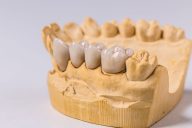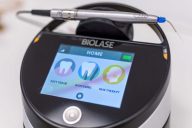ORAL SURGERY
TOOTH EXTRACTION
Never the 1st choice of treatment
Tooth extraction is a procedure commonly used to remove a tooth or a tooth’s root from its socket in the jawbone.
The most common reason for this procedure is tooth decay, although it can also be necessary due to an accident, impacted teeth, or malposition.
Historically, tooth extraction was a common solution for all dental issues, even if the tooth only hurt.
This practice has led to many young people having extensive prosthetic restorations or dentures.
Today, tooth extraction is only considered after all other treatment options have been exhausted, and preserving natural teeth is preferred over prosthetic restorations.

What leads to tooth extraction?
Most common reasons that lead to a tooth extraction are:
- Extended tooth decay ( carious tooth beyond repair )
- Tooth fracture ( beneath the level of the bone socket )
- Periodontal teeth ( heavilly affected by periodontal disease )
- Dental absceses (due to failed endodontic treatment )
- Dental cysts
- Orthodontic treatment ( deemed necessary in cases of overcrowding, where there is not the necessary space to straighten the teeth and achieve the desired result )
- Ectopic teeth ( teeth erupted outside the dental arch and cannot be rearanged with orthodontic treatment )
- Supernumerary teeth ( extra teeth in addition the regular number of teeth )
- Primary teeth ( when they obstruct the normal eruption process of the permanent teeth )
- Impacted teeth, wisdom teeth
Diode laser frenectomy
Tight Tongue / lip Frenulum
A frenulum is a small fold of tissue that attaches the upper or lower lip to the gingiva (gum) or base of the tongue, limiting certain movements.
However, in some cases, the frenulum is too short and restricts or prevents certain movements of the tongue or lip. This can make eating, talking, or normal development difficult for children and can even lead to aesthetic problems.
The solution to this problem is to remove the frenulum and relieve the connected tissues to expand their range of movement.
This procedure is performed using a diode laser, which is a versatile, precise, and minimally invasive surgical device that promotes faster healing, reduces infection risks, and provides perfect hemostasis.
Diode laser gingival depigmentation
Hyperpigmented gums?
Gingival hyperpigmentation is a common aesthetic issue in patients with gummy smiles, where excessive gum tissue is visible when smiling.
This type of pigmentation is often caused by an abnormal deposition of melanin in the gums, resulting in a black appearance.
Fortunately, the use of a dental laser is a safe and effective method for removing this hyperpigmentation from the gingiva.
Diode laser ablation is the most reliable and accurate technique for eliminating hyperpigmented gingival tissue, with several advantages such as short treatment time, immediate haemostasis, sterilization, and faster healing of the tissues.
Studies have shown that healing is quick and straightforward, with no repigmentation observed.
Diode laser cold sore treatment
Cold sore – Herpes Simplex HSV
Cold sores are caused by the herpes simplex virus and can be spread through contact with infected fluid.
They typically heal on their own within a few days to a couple of weeks but can be treated with creams, ointments, or pills if they cause pain or self-consciousness.
However, a more effective treatment option is diode laser therapy, which can reduce the frequency and severity of cold sores.
While the herpes simplex virus cannot be cured, laser treatment can often prevent cold sores from recurring in the same spot.
By seeking early treatment with laser therapy, you can prevent cold sores from developing.
If you experience a tingling sensation that indicates the onset of a cold sore, you should make an appointment with us.
With laser therapy, we can reduce your discomfort, speed up the healing process, and shorten the duration of your outbreak.
Even if you already have a cold sore, laser therapy can still help reduce pain and promote faster healing.














